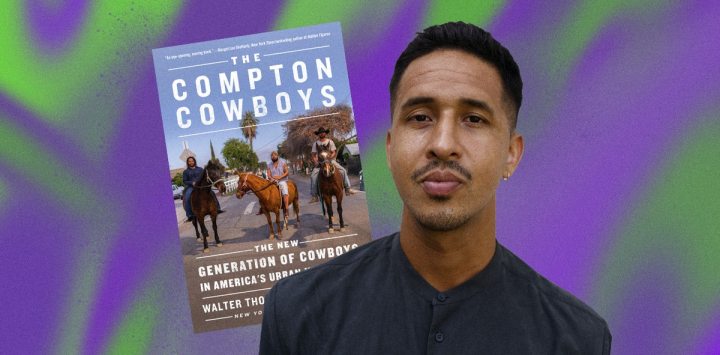‘The Compton Cowboys,’ Walter Thompson-Hernández’s Long-Awaited Project, Is Out Today

Art by Stephany Torres for Remezcla
“Compton, Compton, ain’t so city quite like mine,” Kendrick Lamar sings in his 2012 ode to the South Los Angeles city.
Compton has been dubbed a “home of America’s gangsta rap” and is known for fostering great talent. It’s a multifaceted, misunderstood gem with a rich culture and high crime and murder rates—though most folks are more familiar with the latter. In “The Compton Cowboys: The New Generation of Cowboys in America’s Urban Heartland”, Thompson-Hernández seeks to highlight a beautiful sub-culture that’s been around for hundreds of years yet never quite explored in this format or with this much depth.
Given the current cultural and racial climate, Thompson-Hernández hopes the reader finds the collective story of these Black cowboys (and cowgirl) to be timely and hopefully, educational.
“These weren’t the cowboys I had learned about in my history books or seen on the big screen,” the LA-native writes of a distant yet familiar memory of when he saw the Compton Cowboys for the first time as a youngin. “Yet as I watched them ride at dusk on the same back streets known for rappers like Eazy-E and Dr. Dre, I recognized something inherent in the cowboys who existed in every western film and every hip-hop song: these black men were nonconformist, independent, and strong. They commanded attention and embodied a rebellious spirit, and, most importantly, they were utterly inspiring.”

Thompson-Hernández’s first book, out today, delves more fully into a story he began to tell over a year ago in a deep-dive for The New York Times. The book is an ethnographic project birthed from a year-long immersive study with the group.
“We’ve always wanted to give people a different side of Compton besides gangster rap and basketball,” Leighton BeReal said in 2018. Now, “The Compton Cowboys”—which expands on BeReal’s story, and that of eleven other key figures in the community—will do just that.
“Streets raised us. Horses saved us,” is the Cowboys’ motto.

“I hope readers can understand that at the end of the day, the Compton Cowboys, like other humans around the world, are just trying to belong in a world that tells them that they can’t,” Thompson-Hernández writes in a press statement. “I think that’s a very universal feeling.
“The Compton Cowboys” promises to be both eye-opening and challenging.
It’s about preserving a love story, some would say—one that’s just as much about the perseverance of the horses as it is the humans who ride them.